-
 Bitcoin
Bitcoin $113900
-1.39% -
 Ethereum
Ethereum $3517
-4.15% -
 XRP
XRP $3.009
1.59% -
 Tether USDt
Tether USDt $0.9997
-0.04% -
 BNB
BNB $766.8
-1.41% -
 Solana
Solana $164.6
-2.38% -
 USDC
USDC $0.9998
-0.02% -
 TRON
TRON $0.3277
0.65% -
 Dogecoin
Dogecoin $0.2023
-1.67% -
 Cardano
Cardano $0.7246
0.05% -
 Hyperliquid
Hyperliquid $38.27
-4.77% -
 Sui
Sui $3.528
-0.52% -
 Stellar
Stellar $0.3890
-0.73% -
 Chainlink
Chainlink $16.16
-2.69% -
 Bitcoin Cash
Bitcoin Cash $539.9
-4.38% -
 Hedera
Hedera $0.2425
-2.00% -
 Avalanche
Avalanche $21.71
-0.97% -
 Toncoin
Toncoin $3.662
5.73% -
 Ethena USDe
Ethena USDe $1.000
-0.02% -
 UNUS SED LEO
UNUS SED LEO $8.964
0.35% -
 Litecoin
Litecoin $107.7
2.33% -
 Shiba Inu
Shiba Inu $0.00001223
-0.40% -
 Polkadot
Polkadot $3.617
-0.97% -
 Uniswap
Uniswap $9.052
-2.49% -
 Monero
Monero $295.1
-3.79% -
 Dai
Dai $0.9999
0.00% -
 Bitget Token
Bitget Token $4.315
-1.85% -
 Pepe
Pepe $0.00001060
0.11% -
 Cronos
Cronos $0.1342
-2.72% -
 Aave
Aave $256.0
-0.87%
What accounts do I need to open to buy Bitcoin ETF?
To buy a Bitcoin ETF, choose a brokerage offering the ETF, open an account, fund it, and place your order, considering fees and security measures.
Mar 27, 2025 at 07:00 pm
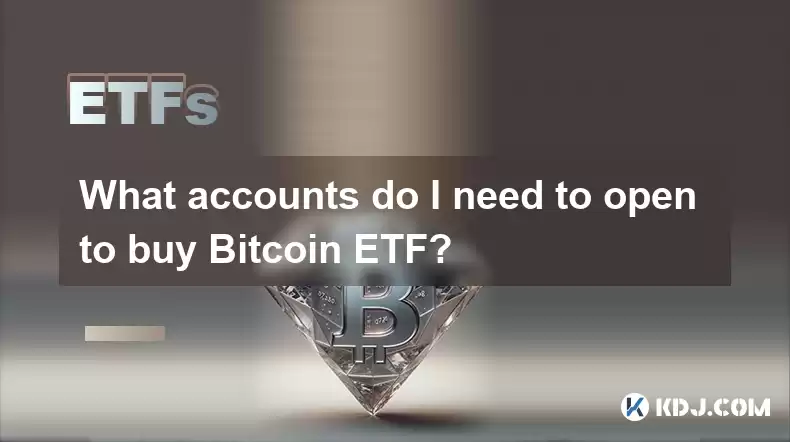
Navigating the Brokerage Landscape for Bitcoin ETF Investment
Buying a Bitcoin ETF (Exchange-Traded Fund) requires navigating the world of brokerage accounts. Unlike directly purchasing Bitcoin, which often involves creating accounts on cryptocurrency exchanges, ETFs are traded on traditional stock exchanges. This means you'll need a brokerage account capable of handling stock and ETF trades. The specific account type isn't necessarily specialized for crypto, but it must support the trading of ETFs listed on relevant exchanges.
The first step is to find a brokerage that offers access to the specific Bitcoin ETF you intend to purchase. Not all brokerages list every ETF, and availability can vary by region. Check the ETF's official website or your chosen brokerage's website to confirm availability before proceeding. Consider factors like trading fees, account minimums, and available research tools when selecting a brokerage.
Once you've chosen a brokerage, you'll need to open a brokerage account. This typically involves providing personal information, such as your name, address, and social security number (or equivalent). You'll also need to provide proof of identity and potentially answer security questions. The application process usually takes a few days to complete, depending on the brokerage and the verification procedures.
After your account is approved, you'll need to fund your account. This can be done via bank transfer, linking a debit card, or other methods offered by your chosen brokerage. Ensure you have sufficient funds to cover the purchase price of the ETF, plus any applicable trading fees. Be aware that some brokerages may have minimum deposit requirements.
Finally, you can place your order to buy the Bitcoin ETF. Most brokerages offer online trading platforms, mobile apps, or even phone support for placing trades. You'll specify the number of shares you want to purchase, and the order will be executed at the prevailing market price (or a limit order price if you prefer). Remember to review your order confirmation carefully before submitting it.
Understanding Different Account Types
While you don't need a specialized "crypto" account to buy a Bitcoin ETF, understanding different account types can be beneficial. A cash account requires you to pay for your purchases in full before the trade executes. A margin account, on the other hand, allows you to borrow funds from your brokerage to purchase securities, leveraging your investment. However, margin accounts carry higher risk due to the potential for debt accumulation.
Retirement accounts, such as IRAs (Individual Retirement Accounts) or 401(k)s, might also offer the possibility of investing in Bitcoin ETFs, depending on the specific plan's investment options. Check with your plan provider to see if Bitcoin ETFs are permitted within your retirement portfolio. Remember that investing in retirement accounts has tax implications that differ from regular brokerage accounts. Consider seeking professional financial advice.
Choosing between these account types depends on your investment goals, risk tolerance, and financial situation. A cash account is generally safer for beginners, while margin accounts can be more suitable for experienced investors comfortable with higher risk. Retirement accounts offer tax advantages but may have restrictions on withdrawals.
Security and Best Practices
Security is paramount when dealing with any financial account, including brokerage accounts used to purchase Bitcoin ETFs. Choose a reputable and regulated brokerage. Look for brokerages with robust security measures, such as two-factor authentication (2FA), encryption, and fraud monitoring systems. Regularly review your account statements for any unauthorized activity.
Keep your login credentials secure. Avoid using easily guessable passwords, and never share your login information with anyone. Be wary of phishing scams attempting to obtain your account details through emails or other communication channels. Consider using a password manager to help manage your passwords securely.
Understand the risks involved in investing in Bitcoin ETFs. Bitcoin's price is highly volatile, meaning the value of your investment can fluctuate significantly in short periods. Before investing, research the ETF's underlying assets, expense ratio, and investment strategy. Consider consulting with a qualified financial advisor to assess your risk tolerance and investment goals.
Diversify your investment portfolio. Don't put all your eggs in one basket. Investing in Bitcoin ETFs shouldn't be your sole investment strategy. Diversification across different asset classes can help mitigate risk and potentially improve returns over the long term. Remember, past performance is not indicative of future results.
Frequently Asked Questions
Q: Can I buy Bitcoin ETFs through any brokerage account?
A: No, not all brokerages offer access to all Bitcoin ETFs. Check the ETF's website and your brokerage's website to confirm availability before opening an account.
Q: What fees are associated with buying Bitcoin ETFs?
A: Fees can include brokerage commissions, ETF expense ratios, and potentially other charges depending on your brokerage and the ETF. Review the fee schedules carefully.
Q: Are Bitcoin ETFs as risky as directly investing in Bitcoin?
A: Bitcoin ETFs offer some level of risk mitigation compared to directly holding Bitcoin, as they are regulated investment products. However, they are still subject to the volatility of the underlying Bitcoin price.
Q: What are the tax implications of investing in Bitcoin ETFs?
A: The tax implications depend on your jurisdiction and the type of account you use (e.g., taxable brokerage account, IRA). Consult a tax professional for personalized advice.
Q: Can I use a Robo-advisor to buy Bitcoin ETFs?
A: Some Robo-advisors may offer access to Bitcoin ETFs as part of their investment portfolios. However, the availability depends on the specific Robo-advisor and their investment offerings. Check their website for details.
Disclaimer:info@kdj.com
The information provided is not trading advice. kdj.com does not assume any responsibility for any investments made based on the information provided in this article. Cryptocurrencies are highly volatile and it is highly recommended that you invest with caution after thorough research!
If you believe that the content used on this website infringes your copyright, please contact us immediately (info@kdj.com) and we will delete it promptly.
- Bitcoin Strategy: Saylor's Not Hoarding, He's Building an Empire
- 2025-08-02 22:30:12
- Bitcoin Bloodbath: Macro Pressures and Liquidations Unleash Crypto Chaos
- 2025-08-02 22:30:12
- Tron, Cold Wallets, and Crypto Trends: What's Hot in the Market?
- 2025-08-02 23:10:12
- Bitcoin's Wild Ride: Davinci, Investors, and the $500K Dream
- 2025-08-02 23:50:12
- Worldcoin, Identity, WLD Price: Decoding the NYC Crypto Buzz
- 2025-08-02 21:10:12
- Shiba Inu: Utility and Community Strength Drive Crypto's Evolution
- 2025-08-02 21:50:12
Related knowledge
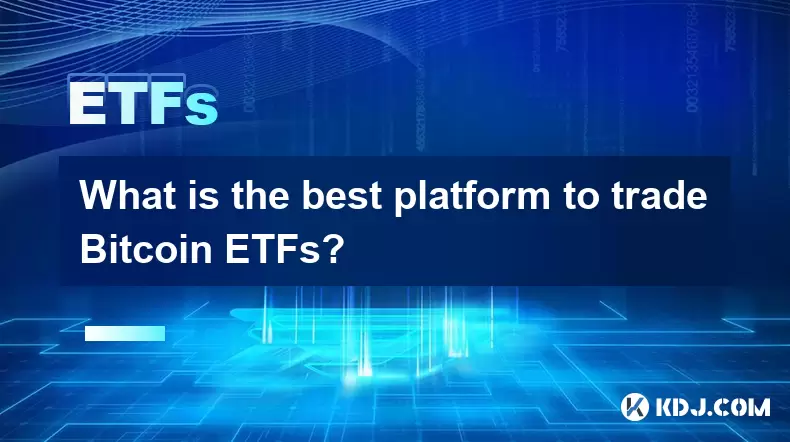
What is the best platform to trade Bitcoin ETFs?
Jul 23,2025 at 04:14am
Understanding Bitcoin ETFs and Their Role in TradingBitcoin Exchange-Traded Funds (ETFs) have gained significant traction among traditional and crypto...
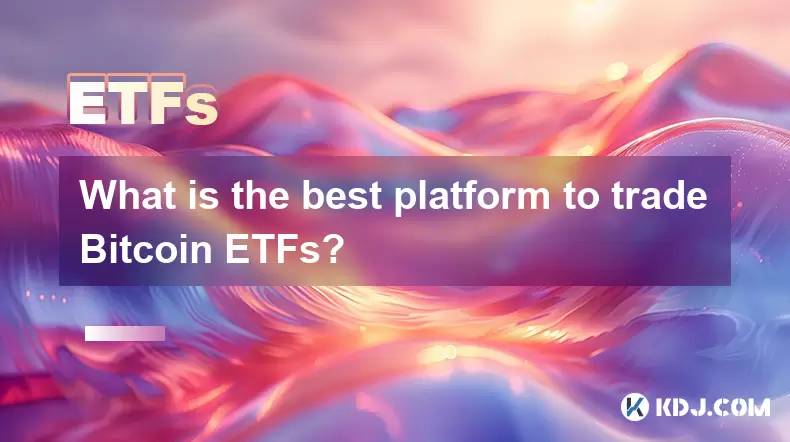
What is the best platform to trade Bitcoin ETFs?
Jul 17,2025 at 03:50pm
Understanding Bitcoin ETFs and Their Role in the MarketBitcoin Exchange-Traded Funds (ETFs) are investment vehicles that track the price of Bitcoin wi...
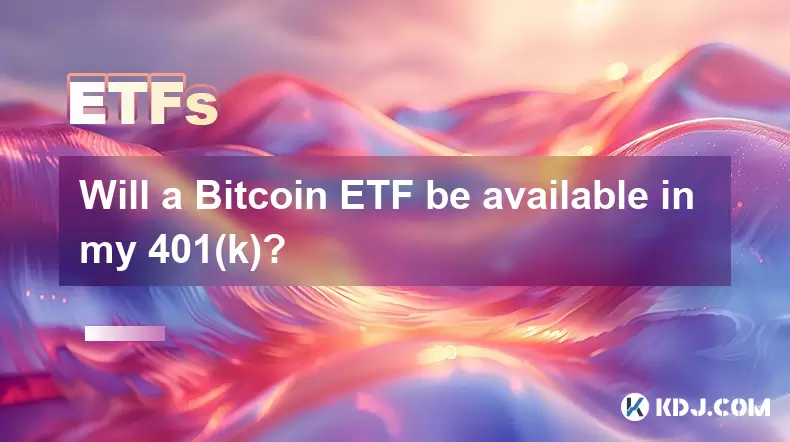
Will a Bitcoin ETF be available in my 401(k)?
Jul 17,2025 at 10:42pm
What is a Bitcoin ETF?A Bitcoin ETF (Exchange-Traded Fund) is an investment vehicle that tracks the price of Bitcoin without requiring investors to di...
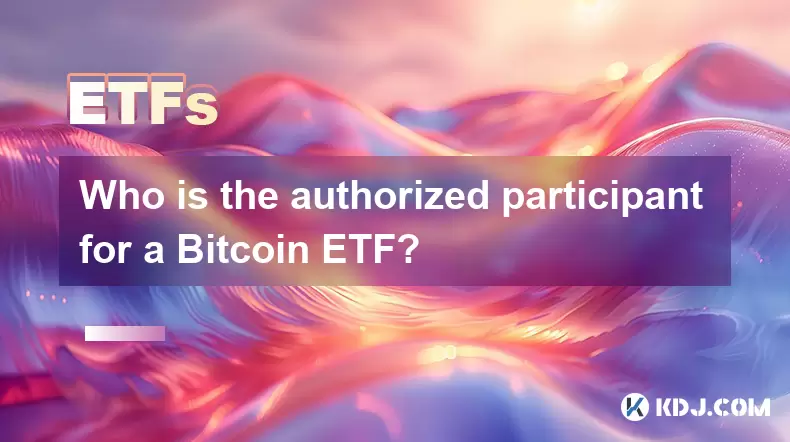
Who is the authorized participant for a Bitcoin ETF?
Jul 18,2025 at 12:42am
Understanding the Role of Authorized Participants in Bitcoin ETFsIn the context of Bitcoin Exchange-Traded Funds (ETFs), an authorized participant (AP...
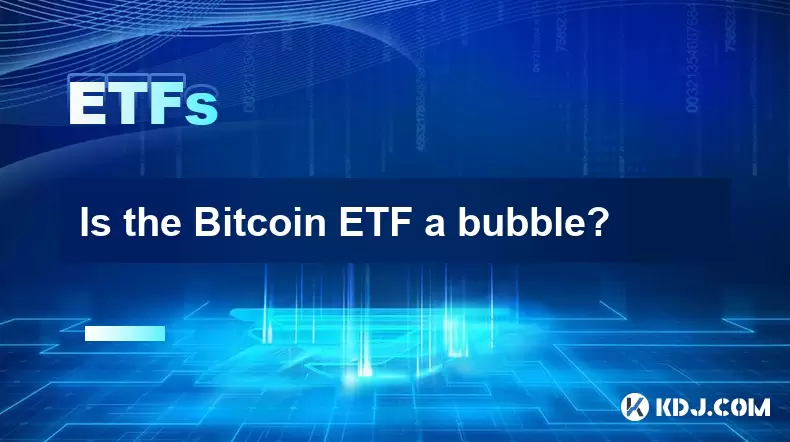
Is the Bitcoin ETF a bubble?
Jul 20,2025 at 06:57am
Understanding the Bitcoin ETF ConceptA Bitcoin Exchange-Traded Fund (ETF) is a financial product that aims to track the price of Bitcoin without requi...
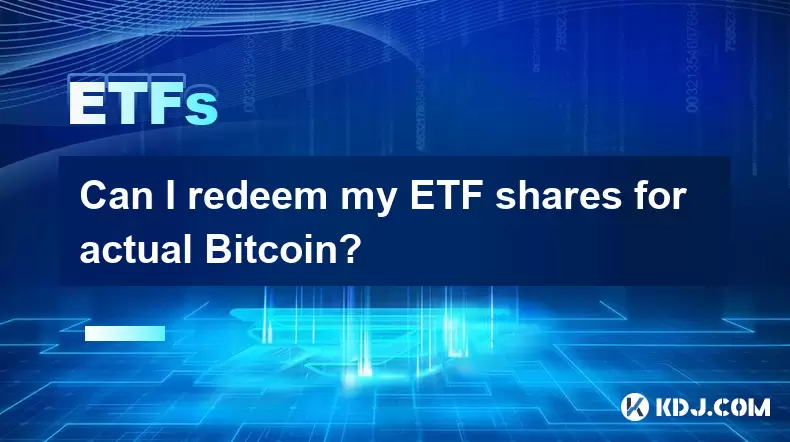
Can I redeem my ETF shares for actual Bitcoin?
Jul 17,2025 at 03:14pm
Understanding ETF Shares and Their Relation to BitcoinExchange-Traded Funds (ETFs) have become a popular investment vehicle for those looking to gain ...

What is the best platform to trade Bitcoin ETFs?
Jul 23,2025 at 04:14am
Understanding Bitcoin ETFs and Their Role in TradingBitcoin Exchange-Traded Funds (ETFs) have gained significant traction among traditional and crypto...

What is the best platform to trade Bitcoin ETFs?
Jul 17,2025 at 03:50pm
Understanding Bitcoin ETFs and Their Role in the MarketBitcoin Exchange-Traded Funds (ETFs) are investment vehicles that track the price of Bitcoin wi...

Will a Bitcoin ETF be available in my 401(k)?
Jul 17,2025 at 10:42pm
What is a Bitcoin ETF?A Bitcoin ETF (Exchange-Traded Fund) is an investment vehicle that tracks the price of Bitcoin without requiring investors to di...

Who is the authorized participant for a Bitcoin ETF?
Jul 18,2025 at 12:42am
Understanding the Role of Authorized Participants in Bitcoin ETFsIn the context of Bitcoin Exchange-Traded Funds (ETFs), an authorized participant (AP...

Is the Bitcoin ETF a bubble?
Jul 20,2025 at 06:57am
Understanding the Bitcoin ETF ConceptA Bitcoin Exchange-Traded Fund (ETF) is a financial product that aims to track the price of Bitcoin without requi...

Can I redeem my ETF shares for actual Bitcoin?
Jul 17,2025 at 03:14pm
Understanding ETF Shares and Their Relation to BitcoinExchange-Traded Funds (ETFs) have become a popular investment vehicle for those looking to gain ...
See all articles

























































































